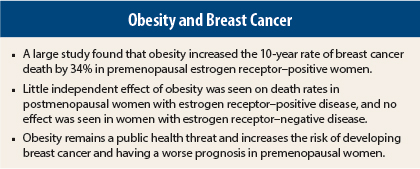According to results of a large study of women with early breast cancer, the presence of obesity increased the risk of breast cancer–related mortality by 34% in premenopausal women with estrogen receptor–positive breast cancer. Obesity had little effect on breast cancer–related mortality in postmenopausal estrogen receptor–positive disease and no effect in estrogen receptor–negative disease.
Surprising Findings
“These results were the opposite of what we expected. Obesity substantially increases blood estrogen levels in postmenopausal women only, so we expected to find increased risk in postmenopausal [estrogen receptor–positive] women as well as premenopausal [estrogen receptor–positive] women. This shows that our understanding of the mechanisms associated with obesity and prognosis is incomplete,” said lead author Hongchao Pan, PhD, a researcher at the University of Oxford in the United Kingdom. Dr. Pan presented these findings at the 2014 ASCO Annual Meeting.1
Nevertheless, these results provide yet another reason to maintain normal weight. “It has been shown that obesity increases the risk of developing cancer, and this study says it increases the risk of poor outcome once you have cancer, if you are premenopausal and have [estrogen receptor–positive] breast cancer,” Dr. Pan said.
Investigators from the Early Breast Cancer Trialists’ Collaborative Group (EBCTCG) compared records of 80,000 women enrolled in 70 clinical trials who received the same treatment in the same clinical trial. Obesity was defined as body mass index ≥ 30 kg/m2, overweight as body mass index of 25 to 30 kg/m2, and normal weight as body mass index of 20 to 25 kg/m2. The researchers collected data on estrogen receptor status, menopausal status, cancer recurrence, and death. Data were adjusted for tumor characteristics, including size and nodal status, and for any differences in treatment.
Independent Risk Factor
A Cox regression analysis was undertaken to compare the effects of obesity on breast cancer mortality in obese vs normal-weight women. Obesity was a significant and independent factor associated with breast cancer–related death in 20,000 premenopausal estrogen receptor–positive women (relative risk [RR] = 1.34 (95% confidence interval [CI] = 1.22–1.47, 2-sided P < .00001). Little effect of obesity was observed in 40,000 postmenopausal estrogen receptor–positive women (RR = 1.06; 95% CI = 0.99–1.14), and no effect was found in 20,000 estrogen receptor–negative women (RR = 1.00, 95% CI = 0.93–1.08).
At 10 years, breast cancer–related mortality was reported in 21.5% of obese women and 16.6% of normal-weight women, a difference of about 5%. ■
Disclosure: The study authors reported no potential conflicts of interest.
Reference
1. Pan H, Gray RG, on behalf of the Early Breast Cancer Trialists’ Collaborative Group: Effect of obesity in premenopausal ER+ early breast cancer: EBCTCG data on 80,000 patients in 70 trials. ASCO Annual Meeting. Abstract 503. Presented May 31, 2014.


